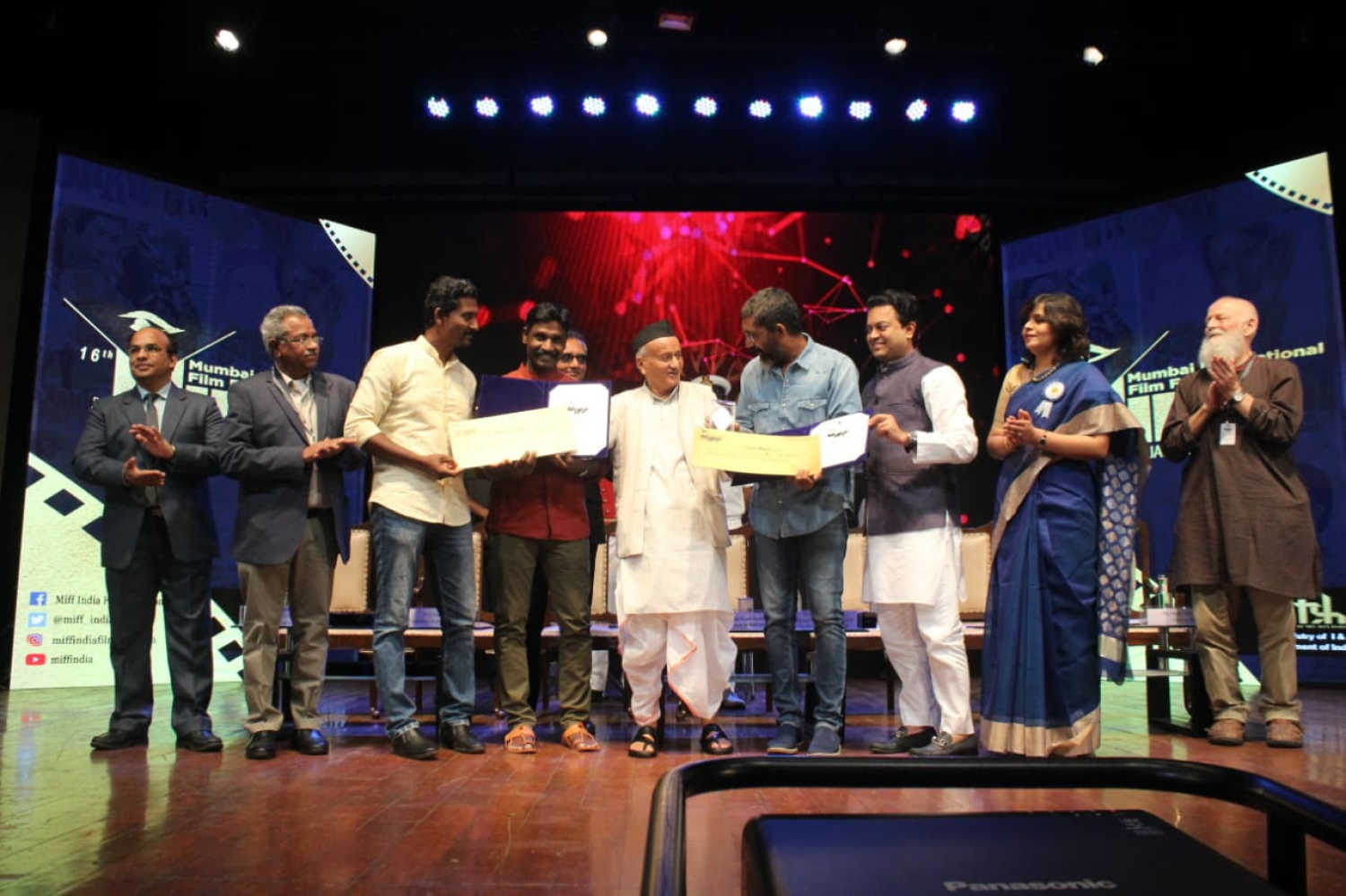The nearly week-long 16th edition of the biennial Mumbai International Film Festival came to a close with a ceremony at the Nehru Centre auditorium in Worli, central Mumbai.
News Bengali English (India) Hindi Marathi Sindhi
Barbara Paz's Babenco: Tell Me When I Die, Nagraj Manjule’s Pavsacha Nibandh win top prizes at MIFF 2020
Mumbai - 03 Feb 2020 23:21 IST
Updated : 04 Feb 2020 16:03 IST


Our Correspondent
The sixteenth edition of the oldest international event for non-feature films in South Asia, the Mumbai International Film Festival for documentary, short fiction and animation films, ended today with awards for the best films handed out at the closing ceremony at the Nehru Centre auditorium in central Mumbai.
The prestigious Golden Conch award for Best Documentary Film went to Barbara Paz's Babenco: Tell Me When I Die. The film on the life of Paz's life partner, the late South American filmmaker Hector Babenco, was selected 'for its intimate and celebratory portrayal of the Brazilian film director and his reflections of life — and death'.
Brazil's consul general, Guilherme Patriota, received the award on behalf of Paz. He read out a written message from her, which said, "Winning this award fills me with huge emotion and it is from India, a country I love and admire. I wish I could be with you to receive the prize in person. I thank you from my heart. Babenco is a film about love, the love of cinema, the love of life. It is a film about how to say farewell to life by doing what you love, filming till the last. Brazil thanks you for this prize. Director Babenca is dancing in Paradise."
Nagraj Manjule’s Pavsacha Nibandh (An Essay On Rain) won the Silver Conch for Best Short Fiction Film 'for its evocation of a grim social reality through the metaphor of rain that transforms into an unwritten essay'. In the Marathi short, a ten-year-old boy writes an essay on rain for a school assignment.
The Silver Conch for Best Animation Film was shared by the German film Portrait Of Suzanne by Izabela Plucinska and the Indian film Panangaatu Nari (The Fox Of The Palmgrove) by Divakar SK.
The IDPA Award for Best Student Film went to Anant Dass Sahni's short film Naked Wall while the Dadasaheb Phalke Chitranagari award for Best Debut Film of a Director went to Umashankar Nair and Gaiti Siddiqui for their short film Grandfather.
The newly introduced Special Award for Best Short Film on Water Conservation and Climate Change went to Aravind M for his four-minute film, The Wetland’s Wail.
Jyotsna Puthran won the award for Best Animation Film for her stop-motion short film MIXI. The award for Best Short Film of up to 45 minutes was awarded to first-time filmmaker Shazia Iqbal for Bebaak: Dying Wind In Her Hair. The Kannada short Lacchavva won a Special Mention for its director, Jai Shankar.
The award for Best Documentary Film under 60 minutes went to Putul Mahmood's Atasi for its portrayal of mental illness. The Special Mention went to Vibha Bakshi for her National award-winning Son Rise on gender empowerment.
Finally, the award for Best Documentary Film above 60 minutes went to Sapna Bhavnani for Sindhustan, a moving personal account of the Sindhi community.
In the technical awards, Jesse Alk work on the documentary Pariah Dog was adjudged Best Sound Design while the Best Editing award was shared by Aniruddha Chakraborty for the short film The Saleswoman and Myriam Rachmuth for the Swiss documentary Fiancees. Bebaak's Sachin Gadankush won the Best Cinematography award.
The Pramod Patil Special Jury award (For Most Innovative / Experimental Film) went to Payal Kapadia for her Marathi short, And What Is The Summer Saying, while Joshy Joseph won a Special Jury mention for his film Echo From The Pukpui Skies.
The closing ceremony was attended by Maharashtra's governor Bhagat Singh Koshyari and cultural affairs minister Amit Deshmukh.
Filmmaker Shaji N Karun, chairman of the international jury, said, “Documentaries represent the real history of India. I thank fellow jury members for their untiring efforts in selecting the best films to be screened at the festival."
Perhaps responding to the controversy over selection of films for the festival this year, and to bring more stability to "a great and important festival such as MIFF", Shaji said the jury was recommending creation of a position of independent artistic director or curator so that the best films from India and the world could be brought to the festival.
The jury also suggested that the festival organizing committee be formed at least a year in advance, for better programming and to provide better information to the public about the films on offer. And "one copy of the winning film should be deposited with the National Film Archive of India", he said.
Thomas Waugh, chairman of the national jury, added, "We need to reach out to the global animation community and get a larger representation of animation films. We need to reach out further to the producers of feature-length documentaries. We need to focus more on independent documentary production. We need to increase the number of selected films so that a broader range of films can be examined by both national and international juries.
"The new section on water conservation is a very promising development. We are very proud of the strong representation of woman directors in the national competition section."
A total of 302 films were screened at the festival, including homages to Ram Mohan, Bhimsain Khurana and VG Samant, legends of Indian animation.
The festival also honoured the legendary Satyajit Ray by showcasing his major documentaries and short films and highlighted Gandhi Smriti, an event to commemorate the 150th birth anniversary of Mahatma Gandhi, by screening rare films from the Films Division archives.
Related topics
Mumbai International Film Festival




